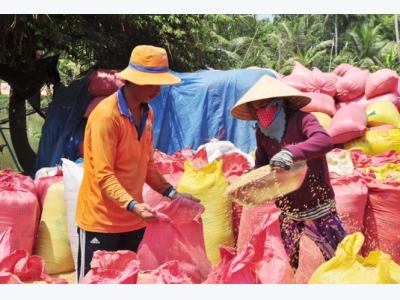Ministry promises to reduce business barriers for rice exporters

The Ministry of Industry and Trade (MOIT) had promised to reduce business preconditions to pave the way for more companies to export rice. However, businesses have complained that barriers to their market entry still exist.
Decree 109 on rice export management has been facing opposition from the business circle since the day it took effect six years ago. The legal document is described as setting too many barriers that prevent businesses from exporting rice.
The requirements on having storehouses with a minimum capacity of 5,000 tons and having at least one husking workshop with the capacity of 10 tons per hour at minimum cannot be satisfied by many enterprises, especially small-scale ones with limited financial capability.
MOIT, which is drafting a decree to replace Decree 109, has promised that it will remove the barriers by easing requirements on storehouse capacity and setting no requirements on the minimum capacity of husking workshops.
The requirements on having storehouses with a minimum capacity of 5,000 tons and having at least one husking workshop with the capacity of 10 tons per hour at minimum cannot be satisfied by many enterprises, especially small-scale ones with limited financial capability.
Meanwhile, businesses will have the right to export special types of rice without having to meet business conditions and get certificates.
MOIT believes that with the new regulations, more businesses will be able to join rice exporters, thus helping boost rice exports and push up rice consumption. The number of rice exporters is estimated to increase by 60-70 percent.
The lower required rice amount for compulsory reserves (5 percent instead of 10 percent as currently applied) would help ease pressure on capital and reduce storage costs. Enterprises will no longer have to copy 6,000-8,000 export contracts (each contains 10-15 pages).
Pham Thai Binh, director of Trung An Hi-tech Agriculture JSC, noted that a number of barriers have been included in the draft decree, while the power of the Vietnam Food Association has been weakened.
“One of the issues which needs to be clarified and put under strict management is the development of material growing areas. But the provisions in the draft decree are not clear,” he said.
“Remember that this has been the weak point of state-owned enterprises for a long time and this is also why Vietnamese rice is not branded,” he added.
Meanwhile, the director of a rice company, which is not eligible for exporting rice under Decree 109, said that he cannot see any major changes in the rice export management policy.
He also noted that the annual rice export value is not high enough to import soybeans.
The draft decree does not mention the policies to be applied to investments in post-rice production.
Có thể bạn quan tâm
 U.S. Vietnam need to cement ties in IT for agriculture
U.S. Vietnam need to cement ties in IT for agriculture The United States and Vietnam should strengthen cooperation in the use of information technology (IT) for developing agriculture
 VFA hikes rice export target on strong demand
VFA hikes rice export target on strong demand The Việt Nam Food Association (VFA) has decided to raise its rice export target from 5.2 million tonnes to 5.6 million tones
 Programme connects tech startups, agri firms
Programme connects tech startups, agri firms A Business Matching Programme that connects agricultural enterprises which need technologies with tech startups was introduced in HCM City on October 24